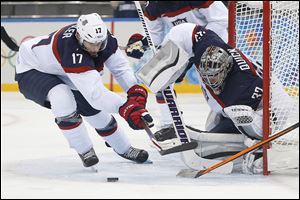
Quick-strike victory
6-goal period sparks U.S. in opening game
2/14/2014
American forward Ryan Kesler, left, and goaltender Jonathan Quick defend against a shot against Slovakia during their first hockey game in Sochi, Russia. The United States rolled 7-1.
SOCHI, Russia — Before his debut as Team USA’s head coach, Dan Bylsma slammed four cups of coffee.
And by the looks of him as he took his spot behind an Olympic bench for the first time, the caffeine binge was achieving its desired effect. He stood there locked in position, with his arms stoically crossed over a crisp blue suit, glaring onto the ice while his players warmed up. This was a man ready for anything.
“On the dawn of our first game here in the Olympics,” Bylsma said, “it got real serious for me.”
Since June, the Penguins’ coach had known this day would come. Bylsma had been preparing for it his entire life, as he rose from his backyard ice rink in Grand Haven, Mich., to Bowling Green State University hockey player, to NHL grinder, to coach of the Wilkes-Barre/Scranton Penguins, to this absurd moment. For the son of an accountant who majored in that exacting discipline himself, there never could be enough preparation. And yet, in the millisecond that it took for the puck to drop to the ice of Shayba Arena on Thursday afternoon, Bylsma had no choice but to let it go.
He simply had to trust his players, these younger men he had only coached for a handful of practices, which amounts to basically nothing in Dan Bylsma Standard Time. The first goal came from defenseman John Carlson, and that had to be a relief. The next six came in one of the greatest offensive barrages in U.S. Olympic history, and — before the second period ended — the game with Slovakia was done for all practical purposes.
The Americans had sent a message loud and clear with their 7-1 victory, and no translation was needed, especially here in Sochi: Bring on the Russians.
Yep, that’s what they said. You can print it.
The Russians! Saturday! Bylsma is a child of the 1980s, brought up on Herb Brooks’ Miracle on Ice and Cold War propaganda, so he gets the rich history between these two teams, these two nations. The anticipation for the Group A match will be so out of control that Bylsma may need something stronger than java.
“Just arriving here,” Bylsma said, “to the Olympic Games and the setting that it is, and being in Russia, playing against the Russians … when we saw the bracket, with Game 2 against the Russians on their home soil, we were pretty excited about the opportunity that was going to be. That’s what we have in front of us now.”
To get to that titanic clash in good standing, the Americans had to get past a Slovakia team that nearly beat Canada in the semifinals in the 2010 Vancouver Games, a team featuring NHL stars like Zdeno Chara and Marian Hossa.
While Team USA controlled the action, a goal by Slovakia’s Tomas Tatar 24 seconds into the second period tied the score, 1-1. The pro-Slovakia crowd of 4,119 erupted, and it suddenly felt like a game. For about 62 seconds anyway, until a Ryan Kesler slap shot from the right faceoff circle found the net. Sixty-six seconds later, it was Paul Stastny scoring the first of his two goals in the United States’ record-tying six-goal second period on an easy rebound in front of the net.
With 4 minutes, 43 seconds left in the second, Dustin Brown ended the U.S. onslaught. It was at that point that Bylsma’s counterpart, Slovakia coach Vladimir Vujtek, had seen enough. He called a timeout, maybe to take bets on how many goals the Americans would end up with.
Over the loudspeaker, LMFAO’s “Party Rock Anthem” played — a fitting tune because, for the Americans in attendance, the celebration was on.
If that beautiful display of offensive hockey wasn’t enough, the Russians were leading lowly Slovenia by a score of only 3-2 next door at the Bolshoy Ice Dome.
They won 5-2, but it served as confirmation that, for these Americans, nine of whom had come so close to gold in Vancouver, there was nothing to be afraid of Saturday.
“Just going back to 1980,” said Team USA fan Giovanni Barone, 43, of Los Angeles, “and thinking about all that history with the Russian teams, being on their turf and sticking it to them is going to be amazing.”
The Block News Alliance consists of The Blade and the Pittsburgh Post-Gazette. J. Brady McCollough is a reporter for the Post-Gazette.